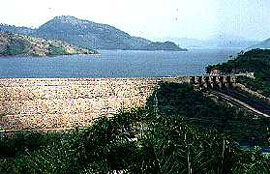 Powering the economy Powering the economy
The most obvious indicator of Ghana's thriving economy
is the exponential growth in energy requirements,
for which the expansion in mining activities is
largely responsible. Plans are well advanced to
increase overall generating capacity by constructing
two new facilitiesa hydroelectric generator by the
Volta River Authority (VRA), and
a barge-mounted plant by the Ghana National
Petroleum Corporation (GNPC). The latter
will be fueled by natural gas Ghana's gas reserves
at Tano Basin and nearby Saltpond, and from Nigeria's
substantial resources upon completion of the regional
gas pipeline across Benin and Togo.
The Volta river has been material to Ghanaian energy planning since the formation of the country. With its great energy potential, the river has supported the industrialization of Ghana and enhanced its citizens' quality of life. These remain the objectives of the VRA today.
Mr. E. Kalitsi, executive director of the VRA, believes that electricity is only one resource the river provides to Ghana. He says: "The Volta Lake is like a sea in the middle of the country. It covers nearly 4% of the country's surface. While electrical generation and distribution will help in industrial development, the Volta also has great potential for the transportation of goods and commodities.

There is a Volta Lake transport development program underway where we are building ports and draining stages."
Ghana's US$1 billion commitment to energy development demonstrates a clear understanding of the vital link between energy availability and achieving economic objectives. GNPC is therefore committed to the government's gateway policy under the country's Vision 2020 program. Chief Executive Tsatsu Tsikata says, "Africa's current lead in world gold production will not be sustained without securing a long-term energy supply at reasonable cost. Assuring investors that projects can be brought to a successful conclusion often depends on how energy risks are handled."
Ghana is positioning itself to play an important role in the proposed regional power pool with GNPC as a facilitator. "We are working with Chevron regarding the Nigerian gas pipeline, as we believe that natural gas is the energy that can help drive Ghana's Vision 2020," says Mr. Tsikata. |
To achieve some of its objectives, GNPC, through its Western Power subsidiary, offers a large incentive package to investors in power generation and transmission. The strategic goal is to provide long-term, secure power to gold mining companies in a manner that will protect their viability, even in periods of falling gold prices.
GNPC's agreement structure departs from the norm. "We consider return on investment as the basis for determining the additional entitlement of the state, rather than production levels. This is a better system because ultimately, return on investment is the key for future investment decisions," says Mr. Tsikata. He points to a system in place helping the foreign investor clear bureaucratic delays by giving the example of Hunt Oil. Hunt was able to acquire crucial new data within two months of signing an agreement, and before setting up an office in Ghana.
Ghana´s petroleum needs are currently supplied by the Tema Oil Refinery (TOR). Demand has grown for refined petroleum products such that TOR, with a design capacity of 1.25 million tons, is incapable of meeting the country's needs at full capacity.
The refinery is presently undergoing a US$65 million expansion program financed by South Koreans investors to increase capacity to 2 million tons per annum. The second, long-term stage will allow TOR to convert its residual fuel into gasoline, LPG, kerosene and gas oil. At present the residual fuel is sold off virtually at bargain prices.
TOR's chief executive, Mr. William Parker is looking forward to a greater role for the refinery in the region. A British firm has recently approached TOR with the intent of building a refining facility in the Free Port Zone . "They would like to link with us to produce 125,000 barrels per stream daily. With this capacity, we could become an export center," says Mr. Parker. "Ghana is the gateway; it sits in the middle of the West African Region and it has good workers of ability."
At present, Ghana is selling LPG to Benin, Togo, Burkina Faso and Mali. Mr. Parker believes such sales prove the government's much talked about gateway vision is not just a fantasy. "It is a realistic vision, but it needs enthusiasm and commitment. I see our refinery as a center for training technical people, producing Ghana's energy requirements at the most competitive prices, and, if properly developed, helping meet the region's present and future needs." |

